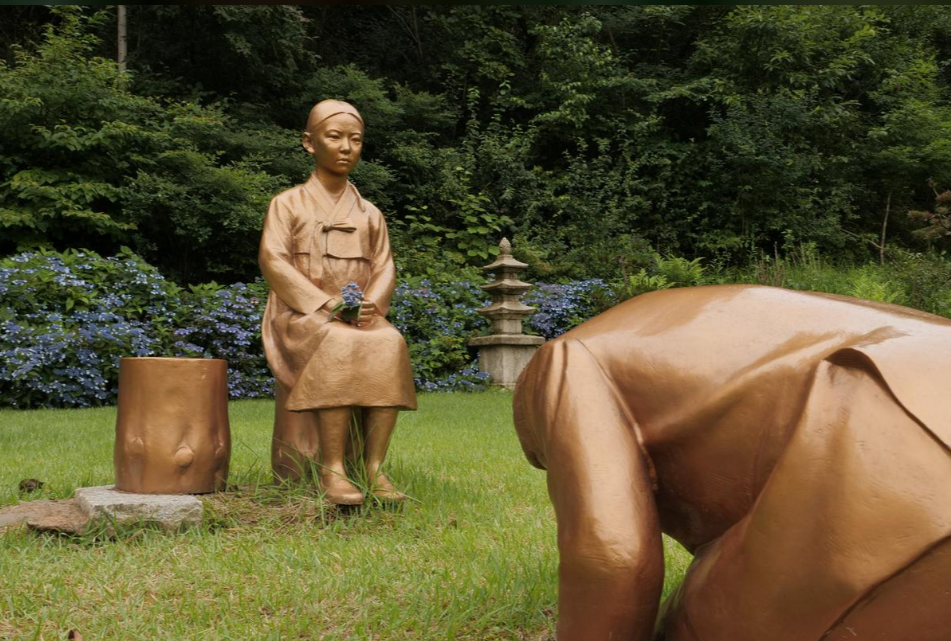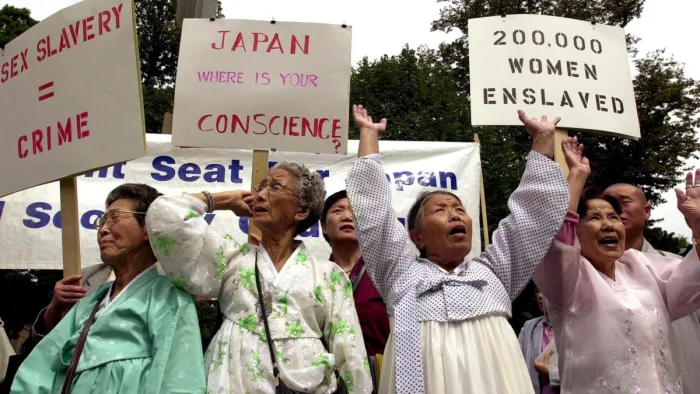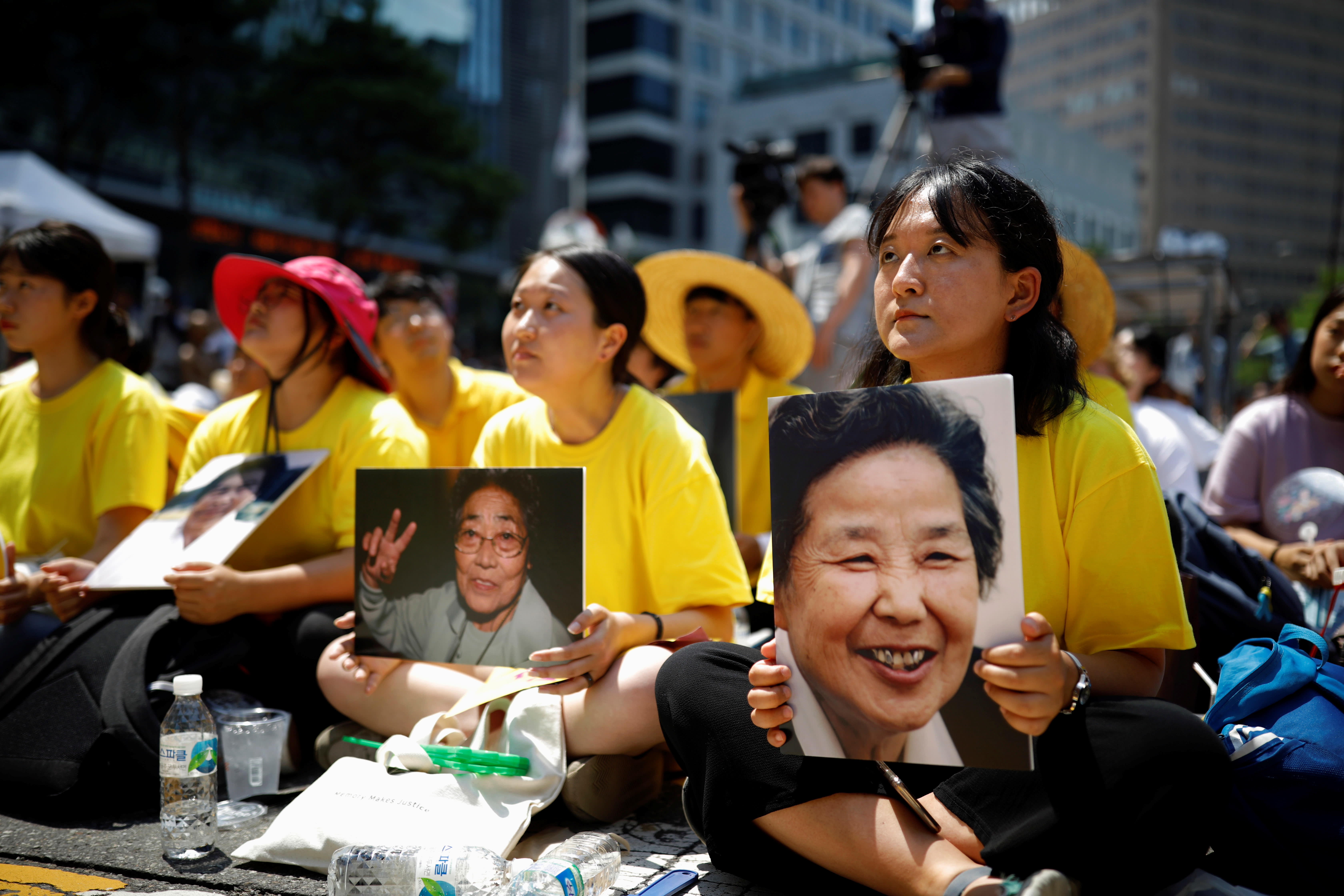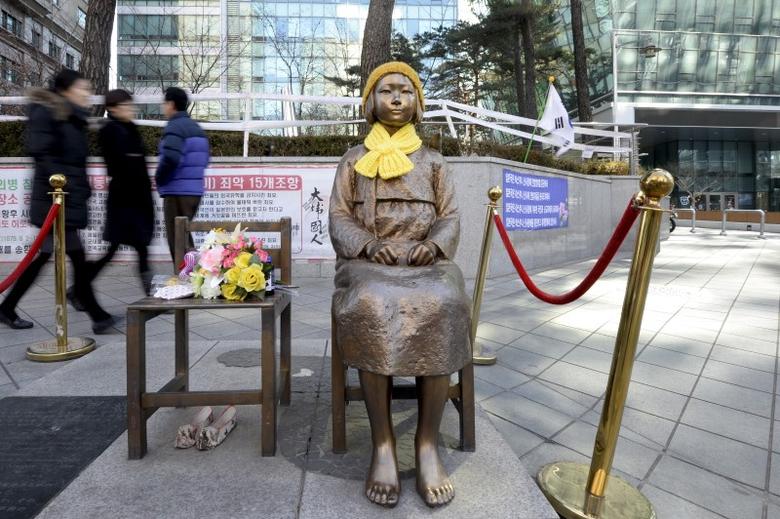
A statue symbolizing Japanese Prime Minister Shinzo Abe taking a deep bow to "comfort woman" is pictured at Korea Botanic Garden in Pyeongchang, South Korea, July 28, 2020. /Reuters
A statue symbolizing Japanese Prime Minister Shinzo Abe taking a deep bow to "comfort woman" is pictured at Korea Botanic Garden in Pyeongchang, South Korea, July 28, 2020. /Reuters
Recently erected statues in South Korea of a man depicting Japanese Prime Minister Shinzo Abe, kneeling and bowing to a a seated girl symbolizing South Korean "comfort women," a euphemism for women forced to work in Japan's wartime brothels, could further hurt bilateral relations, Japan's top government spokesman said Tuesday.
Japan's chief cabinet secretary, Yoshihide Suga, warned if reports of the statue on display were true, it would be an "unforgivable" breach of international protocol.
"While we have yet to confirm this, it would be unacceptable under international courtesy," Suga told a news conference in Tokyo.
The statues sparked controversy, as some media outlets reported that the male figure represented the Japanese Prime Minister.

A group of women, who survived being forced into brothels set up by the Japanese military during World War II, protesting in front of the Japanese Embassy in 2000, demanding an apology for their enslavement. /AFP
A group of women, who survived being forced into brothels set up by the Japanese military during World War II, protesting in front of the Japanese Embassy in 2000, demanding an apology for their enslavement. /AFP
The head of the privately run botanical garden who commissioned the work later clarified the kneeling figure was meant to represent anyone who could be in the position to apologize formally for the historic wrong, and it was not Abe in particular, though he personally wants it to be Abe, according to Yonhap News Agency.
The website of the garden, in the rural Pyeongchang county, names the statue "Eternal Atonement.”
South Korea's foreign ministry said Tuesday there should be international courtesy for foreign leaders to consider, but declined further comment, saying it was an act by a private citizen.
"We intend to refrain from comments on a private-level event unrelated to the government," the ministry claimed in a press guidance statement. "However, the government believes it is necessary to take the aspect of international comity toward foreign leaders into consideration as well."

Students hold portraits of deceased former South Korean "comfort women" during a weekly anti-Japan rally in Seoul. /Reuters
Students hold portraits of deceased former South Korean "comfort women" during a weekly anti-Japan rally in Seoul. /Reuters
The garden proprietor has canceled his plan for an unveiling ceremony for the 4-year-old statues as the dispute arose. But, he insists that he hopes to see a responsible person, no matter if it is the Japanese prime minister or other politicians from Japan, apologizing for their wartime atrocities, Yonhap News Agency reported.
The issue of comfort women, mostly Koreans forced to work in Japan's brothels before and during World War II, and the question of whether victims were adequately compensated have long been a thorn in ties.
Japan regards the matter as "finally and irreversibly resolved" by a 2015 agreement reached by Abe and then South Korean President Park Geun-hye under which Abe apologized and pledged a fund to support the survivors.

A statue of a girl that represents the sexual victims by the Japanese military is seen in front of Japanese embassy in Seoul, South Korea, December 28, 2015. /Reuters
A statue of a girl that represents the sexual victims by the Japanese military is seen in front of Japanese embassy in Seoul, South Korea, December 28, 2015. /Reuters
But South Korean President Moon Jae-in's government has declared the deal flawed, in effect voiding it.
Similar statues of girls alone have been set up in front of the Japanese Embassy in Seoul and elsewhere to honor the persecuted women.
"Comfort women" were women and girls forced into sexual slavery by the Imperial Japanese Army before and during World War II.
Research shows some 400,000 women in Asia were forced to be "comfort women" for the Japanese army during World War II. Most of the women were from occupied countries, including Korea, China, and the Philippines, nearly half of whom were Chinese.
(With input from agencies)